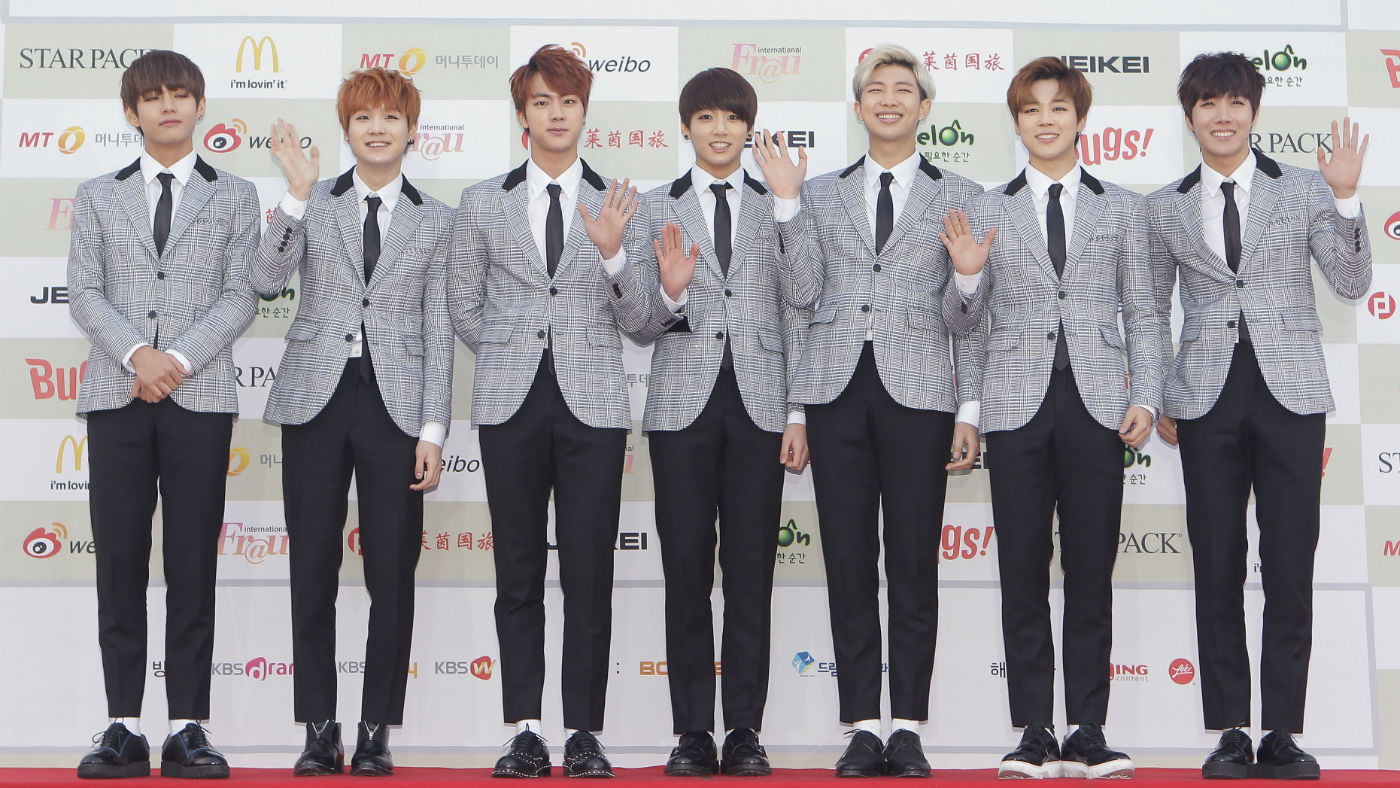BTS: why the world’s best-selling boy band is splitting up
South Korea’s compulsory military service may be a factor in ‘hiatus’

A free daily email with the biggest news stories of the day – and the best features from TheWeek.com
You are now subscribed
Your newsletter sign-up was successful
Globally successful super-band BTS are to split after a “rough” patch left them “exhausted”, they revealed to fans this week.
During a televised dinner celebrating their anniversary, the group announced to fans they would be splitting in order to “mature” and pursue solo projects.
Band member Jimin revealed the group had been going through a “rough patch” at their annual FESTA dinner, where the band reflected on their achievements during their nine years together. “We’re trying to find our identity and that’s an exhausting and long process,” the 26-year-old band member explained.
The Week
Escape your echo chamber. Get the facts behind the news, plus analysis from multiple perspectives.

Sign up for The Week's Free Newsletters
From our morning news briefing to a weekly Good News Newsletter, get the best of The Week delivered directly to your inbox.
From our morning news briefing to a weekly Good News Newsletter, get the best of The Week delivered directly to your inbox.
Another band member, 29-year-old Suga, said that the group were “going into a hiatus”. But the group’s management company, Hybe, later said the group were not on hiatus but will “take time to explore solo projects at this time and remain active in various different formats”
Who are BTS?
BTS are a seven-member boy band founded in 2012 which has quickly become one of South Korea’s biggest acts. Made up of members RM, Jungkook, Jin, Jimin, Suga, J-Hope and V, they were named as the world’s best-selling artists of 2021 in a chart recently compiled by music industry body the IFPI.
It came after a “hugely” successful year for the band, who topped the US Billboard charts three times, and earned a Grammy nomination for their Michael Jackson-inspired hit single, Butter, said the BBC.
BTS stands for Bangtan Sonyeondan, meaning “bulletproof Boy Scout” in Korean, but to Western fans, the band is commonly also called Beyond the Scene. The group announced its new English name in July 2017, in a move perceived by music critics as an attempt to expand its reach into the English-language market.
A free daily email with the biggest news stories of the day – and the best features from TheWeek.com
The bandmates may look like typical clean-cut pop idols, but their sophisticated blend of K-pop and hip-hop has won critical praise, and the group has also been applauded for tackling subjects that remain taboo in South Korea, such as bullying and mental health.
Why is BTS so popular?
The band is credited with generating “billions of dollars for the South Korean economy”, said The Guardian. One testament to their success is a recent announcement from their record label, which said they had reported a “surge” in profits this year despite the pandemic, and the band holding fewer concerts, the paper added.
They are also one of the few acts “since The Beatles” to release four albums that hit number one in the US in less than two years.
Their music may have won critical praise, but the main driver of BTS’s meteoric success is their deft use of social media. The band’s aggressive social media strategy began before the group had even released its first single, but the hard work has paid off in the form of millions of devoted followers, many of whom feel a personal connection to their idols.
In March, the Guinness World Records said they had “smashed” the records for most followers for a music group on Twitter, Instagram and TikTok.
BTS fans call themselves the Army, which, in accordance with the slightly garbled English that characterises the fandom lexicon, stands for Adorable Representative MC for Youth.
Are BTS breaking up for good?
While the band has said they are taking a break in order to explore new projects, fans have reason to hope they will see them back together one day.
Band member V hinted that the split may not be for good, telling fans during the hour-long dinner that the group would get back together in the future, adding: “later, when we gather again as a group, that synergy will be like no other”.
His bandmate, RM, said that they all needed time to grow and mature as individuals.
“I always thought that BTS was different from other groups, but the problem with K-pop and the whole idol system is that they don’t give you time to mature,” he said. “You have to keep producing music and keep doing something.”
The announcement may also be tied to the fact that all able-bodied South Korean men under the age of 30 must perform around two years of military service – “and BTS have not been granted an exemption”, said the BBC.
Jin, the oldest member of the group, is due to begin his military service by the end of this year, said The Guardian. South Korea’s national assembly is currently discussing a revision to the law to allow exemptions for people who make “a considerable contribution to South Korea’s international standing”, said the paper.
However, the bill is unlikely to be passed due to widespread opposition from men in their 20s, the majority of whom voted for the country’s new president, Yoon Suk-yeol, who has been accused of promoting a “gender divide” in South Korean society by critics.
-
 ‘Poor time management isn’t just an inconvenience’
‘Poor time management isn’t just an inconvenience’Instant Opinion Opinion, comment and editorials of the day
-
 Bad Bunny’s Super Bowl: A win for unity
Bad Bunny’s Super Bowl: A win for unityFeature The global superstar's halftime show was a celebration for everyone to enjoy
-
 Book reviews: ‘Bonfire of the Murdochs’ and ‘The Typewriter and the Guillotine’
Book reviews: ‘Bonfire of the Murdochs’ and ‘The Typewriter and the Guillotine’Feature New insights into the Murdoch family’s turmoil and a renowned journalist’s time in pre-World War II Paris
-
 Bad Bunny, Lamar, K-pop make Grammy history
Bad Bunny, Lamar, K-pop make Grammy historySpeed Read The Puerto Rican artist will perform at the Super Bowl this weekend
-
 Is a social media ban for teens the answer?
Is a social media ban for teens the answer?Talking Point Australia is leading the charge in banning social media for people under 16 — but there is lingering doubt as to the efficacy of such laws
-
 How Utah became a media focal point
How Utah became a media focal pointIn Depth In producing the stars of #MomTok and reality TV alike, Utah has emerged as a media powerhouse
-
 Australia’s teens brace for social media ban
Australia’s teens brace for social media banIn The Spotlight Under-16s will be banned from having accounts on major platforms
-
 Are boomers the real phone addicts?
Are boomers the real phone addicts?In The Spotlight There’s an ‘explosion in screentime’ among older people – and they’re more vulnerable to misinformation
-
 The six-seven meme that has taken over the world
The six-seven meme that has taken over the worldIn the Spotlight With roots in rap and basketball, the phrase has young people obsessed, and it could be here to stay
-
 BookTok is reviving publishing – but at what cost?
BookTok is reviving publishing – but at what cost?In The Spotlight Social media recommendations are boosting book sales but critics give the trend mixed reviews
-
 The rise of the performative male
The rise of the performative maleTalking Point What the latest internet trope tells us about gender roles, dating and male illiteracy